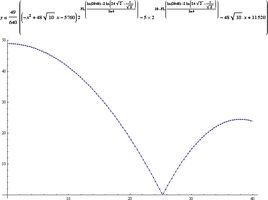特殊值
floor(3.14) = 3.0
floor(9.999999) = 9.0
floor(-3.14) = -4.0
floor(-9.999999) = -10
C語言例子
在C語言的庫函式中,floor函式的語法如下 :
#include <math.h>
double floor( double arg );
功能: 函式返回參數不大於 arg的最大整數。例如,
x = 6.04;
y = floor( x );
y的值為6.0.
與floor函式對應的是ceil 函式,即上取整函式。
有趣的是,floor在英文中是地板的意思,而ceil是天花板的意思,很形象地描述了下取整和上取整的數學運算。
python例子
在python語言的math模組中,floor函式的語法如下 :
以下是 floor() 方法的語法:
import math
math.floor( x )
注意:floor()是不能直接訪問的,需要導入 math 模組,通過靜態對象調用該方法。
C#例子
double[] values = {7.03, 7.64, 0.12, -0.12, -7.1, -7.6};
Console.WriteLine(" Value Ceiling Floor\n");
foreach (double value in values) Console.WriteLine("{0,7} {1,16} {2,14}", value, Math.Ceiling(value), Math.Floor(value));
// The example displays the following output to the console:
// Value Ceiling Floor
//
// 7.03 8 7
// 7.64 8 7
// 0.12 1 0
// -0.12 0 -1
// -7.1 -7 -8
// -7.6 -7 -8
JavaScript
定義和用法
floor() 方法可對一個數進行下捨入 。
語法
Math.floor(x)
| 參數 | 描述 |
| x | 必需。任意數值或表達式。 |
返回值
小於等於 x,且與 x 最接近的整數。
說明
floor() 方法執行的是向下取整計算,它返回的是小於或等於函式參數,並且與之最接近的整數。
實例
在本例中,我們將在不同的數字上使用 floor() 方法:
<script type="text/javascript">
document.write(Math.floor(0.60) + "<br />")
document.write(Math.floor(0.40) + "<br />")
document.write(Math.floor(5) + "<br />")
document.write(Math.floor(5.1) + "<br />")
document.write(Math.floor(-5.1) + "<br />")
document.write(Math.floor(-5.9))
</script>
輸出:
0
0
5
5
-6
-6
pascal
函式定義與語法
(未完善,待補充)
函式名: floor
功 能: 返回比參數小的最大整數
用 法: floor(x:floor);
原型:function floor(x:float):integer;
注意事項:當x大於integer的範圍時會引發溢出錯誤
庫:Math
函式實例
uses math;beginwrite(floor(6.6));//輸出6
end.Excel函式
英語解釋 floor:地板,地面 (樓房的)層 (海洋、山洞等的)底 (議會的)議員席;(會議上的)發言權 物價、工資等的)最低額;底價
lab函式
floor(n)即對n向負方向捨入如:floor(pi)=3; floor(3.5)=3; floor(-3.2)=-4
C++
#include <iostream>
#include<cmath>
using namespace std;
int main() {
cout << floor(1.1) << endl;
cout << floor(1.2) << endl;
cout << floor(1.3) << endl;
cout << floor(1.4) << endl;
cout << floor(1.5) << endl;
cout << floor(1.6) << endl;
return 0;
}
輸出:
1
1
1
1
1
1

